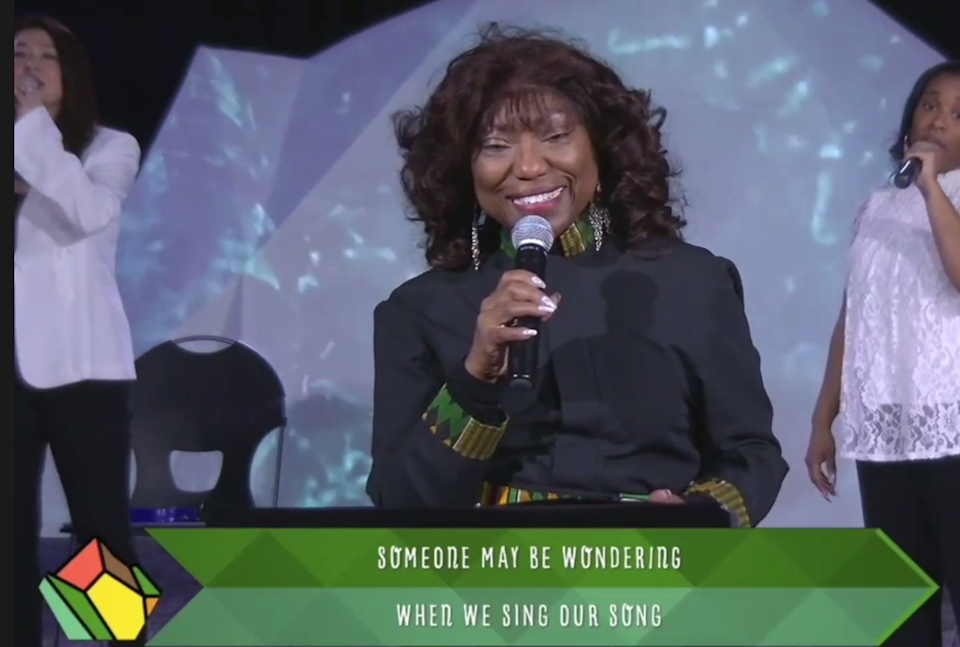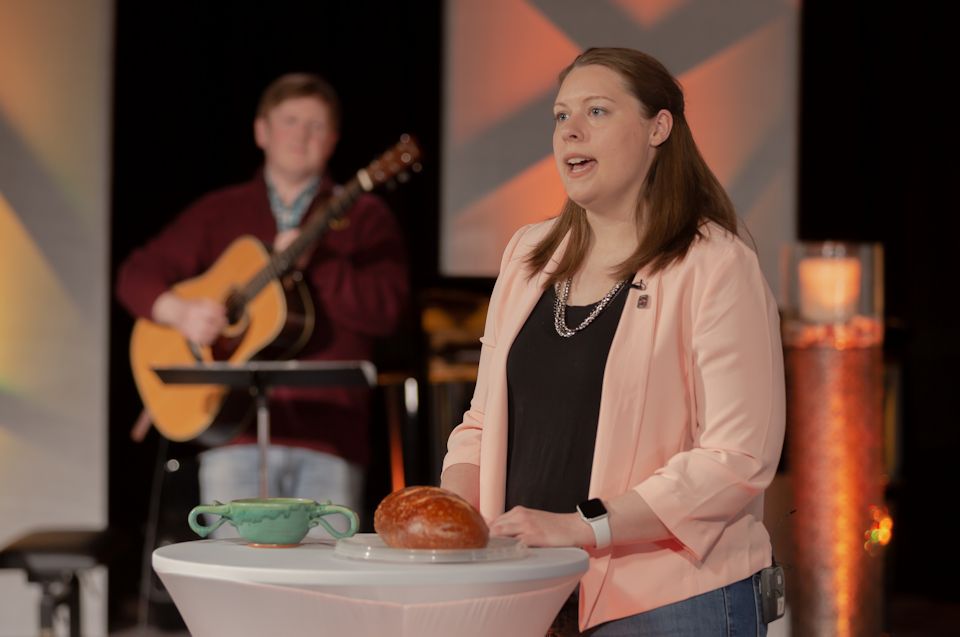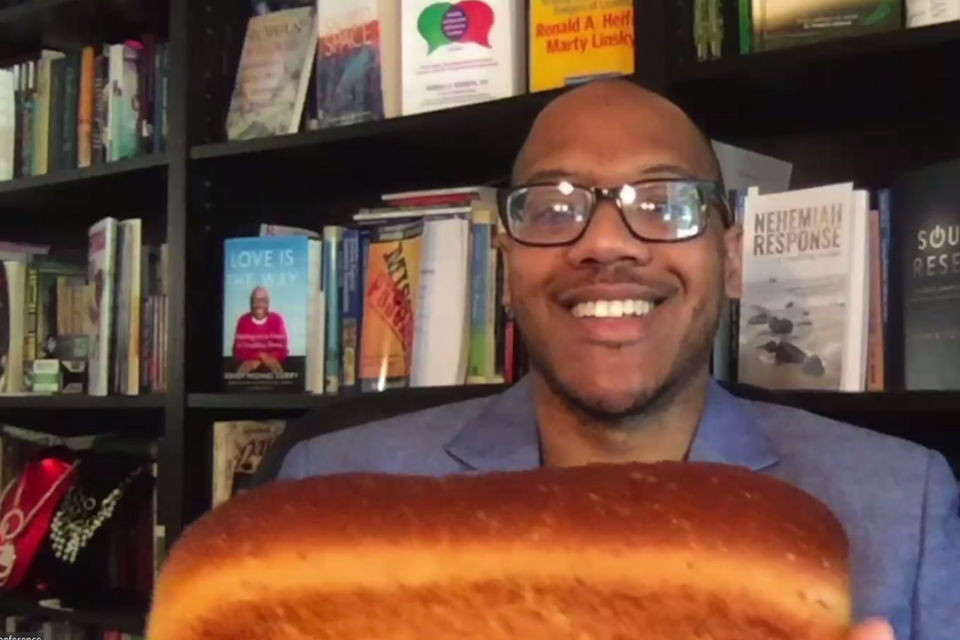The Rev. Dr. Cynthia Wilson and the Rev. Paul Perez led worship at The Michigan Annual Conference on June 5. Members were asked not to let their troubles interrupt their love of God.
GLENN M. WAGNER
Michigan Conference Communications
June 5, 2021 | LANSING -- Saturday worship services at the 2021 Virtual Michigan Annual Conference made the transition from Babylon in the 7th century BCE to Michigan in the 21st century CE. The opening service featured the Rev. Dr. Cynthia Wilson with songs for a new day. Closing worship featured young adults from across the annual conference. They and preacher Paul Perez raised the question, "How might we sing a NEW song?"
Opening worship with the Rev. Dr. Cynthia Wilson
Saturday morning worship was a reminder of a shared history. We are a people who have an abiding faith in God that has been passed down to us from slaves, exiles, persecuted minority groups, and missionaries who risked their well-being to remind us that the God we worship is embodied in sacrificial love and amazing grace and encourages us to sing songs of faith even in difficult circumstances.
This service continued to express the themes of the Conference worship services of the previous two days. This is a challenging time, similar in some respects to the period of Jewish exile in Babylon referenced in Psalm 137. It can be difficult to sing the Lord’s song. Saturday morning’s worship also showcased the diversity of talented leaders in our conference.
The morning’s preacher, The Rev. Dr. Cynthia A. Wilson, Executive Director of Worship Resources at our United Methodist Discipleship Ministries agency, opened the service by musically reminding us of Babylon.

Eric Mulanda Ndua, a native of Congo, graduate and former student body president of Africa University, and now pastor of Lansing’s Mount Hope United Methodist Church, led the band and singing in response to God’s call to sing a new song:
Listen up people! Open your mouths and sing the story,
Those of you who are far from home, immigrants, exiles, victims of oppression,
Those of you gathered here who need help, compassion,
Some of you have come through the water, some through the flood,
Yet I bid you come over a way that with tears has been watered.
Rev. Kennetha Bigham-Tsai, a Michigan Conference Elder who leads our denomination’s Connectional Table, provided a female voice to God’s call,
Listen up people! Open your mouths and sing the story,
sing the songs that your ancestors taught you!
Do not hide the love of my law.
Sing of my power and my might, tell them of my strength.
Sing to them the story of how I rescued you from slavery;
Tell them how I was your bridge over troubled water;
You must be storytellers and story listeners too!
Brittney Stephan, Associate Director for Multicultural Vibrancy for the Michigan Conference, prepared the congregation for prayer with a brief instruction on breathing.
The invocation was followed by a prayer that was responsive, musical, and led by multiple voices. Prayer reminded us of the power of God, the grace of God, and our mission to serve as God’s people even when singing is difficult in challenging times.
Scripture was Psalm 137, written by the exiles in Babylon who struggled with how to faithfully sing the Lord’s song in a new land while continuing to seethe over remembered injustice.
Rev. Dr. Cynthia Wilson shared her message of truth and hope. She reminded us of the truth that gospel music from African slaves was America’s first indigenous musical genre and that soul-filled singing of God’s song is a way to remember God’s presence. She explored the song of Hebrew slaves in Babylon in Psalm 137 and remembered how oppressed people found the strength to face adversity by singing songs of faith anyway. She said:
There are times you just don’t feel like blessing the Lord
This is just the time to reach into our souls, reclaim our song|
Even in the valley of the shadow of death
I came from Nashville. Folks know how to sing there.
I came to Michigan because you have a rich history of song
I hope you begin to sing again. So the sick are healed.
I hope you sing until the power of the Holy Ghost comes down.
Michigan Conference. You cannot let trouble interrupt your praise.
In the closing benediction, Wilson led in song the traditional blessing from the Aaronic benediction on Numbers 6:22-2. “May the Lord bless you, and keep you, make his face to shine upon you and give you peace.”
Click here for a transcript of the service, including the message by the Rev. Dr. Cynthia Wilson.
Closing worship with Paul Perez and young clergy
Closing Worship continued the theme of Singing the Lord’s Song that guided the previous times of praise. The service was prefaced by the close of the conference business session. After difficult wrestling with resolutions and the passing of the budget in challenging financial times, our virtual business session ended on a hopeful note with an unexpected joyful announcement by Bishop David Bard. He and his wife Julie received the glorious news during conference business this morning of the birth of a new grandson.
The closing worship, led and designed by a team of young Michigan conference clergy, moved the conference them of Singing the Lord’s song in a Foreign land past Psalms of lament which are helpful in times of grief and stress and more broadly invited us to find inspiration in the guidance of all the Psalms which speak to the many aspects of our human condition.
The opening of the service was ably led by Ali Belski, Director of Student Ministries, Young Adults, and Communication at Livonia Newburg UMC. She sang, offered words of welcome and prayer.
The Rev. Ruth Vandersande, associate pastor at Midland First UMC; the Rev. Paul Hahm, pastor of Grace UMC in Lansing; the Rev. Paul Reissmann, pastor of Wayland UMC; and the Rev. Corey Simon, pastor of Martin and Shelbyville UMCs followed with a collect prayer that invoked God’s presence with a younger vibe and asked God to “Sing in us.”
After the reading by Simon of the uplifting Psalm 98, “O sing to the Lord a new song, for he has done marvelous things,” the Rev. Paul Perez, Director of Connectional Ministries for the Michigan Conference challenged the conference in his message to be a people shaped by all of the Psalms. He urged members to find room in our congregations and our Christian service for both lament and praise, honesty, and sharing of hope.
Paul’s questioning invitation to sing a new song was eloquent. He shared a powerful story of his last visit with his grandmother before her death. He read the underlined Psalms from his grandmother’s well-read Bible during his visit with her which boldly declares life as it really is. Perez affirmed the power of the Psalms to help us in life’s challenges as people of faith. He concluded his passionate message on the Psalms while reflecting on the end of conference and the beginning of another year of ministry for Christ. He encouraged Michigan United Methodists to see the truth of injustice and inequality and to be honest with each other.
What would it really mean for the church to be a place of honest, raw emotion ... a place where extreme joy, rage, and despair could be expressed and acknowledged? . . .
What would it mean for us to be a Psalm 98 church … A church that makes room and sits with the unanswered and unresolved?
What would it mean for the church to be a place where we address God directly and expect to hear and answer . . . even if the answer is not what we expected or an answer we did not want or completely overturns our way of life?
What would it mean to be a church who embodies a God who sees our tears, hears our cries, witnesses our anger, delights in our joy?
What would it mean for the church to embody a God who sets an overflowing table in the midst of our enemies?
Can we yet, be a church like this? A church that not only sings the Lord’s song in a strange land but a church that sings to God a brand-new song?
The answer is simple. But it is not easy.
What new song would you sing?
Carl Gladstone, a Deacon serving Motor City Wesley and Dearborn First UMC, provided leadership for singing, “Love Has Made Us,” and “Father of Earth and Heaven.”

The Rev. Cora Glass, Director of Lifelong Faith Formation at Central UMC in Waterford, led the online gathering in sharing a virtual love feast with bread and water. She reminded worshippers of the history of the meal noting,
The Love Feast, or Agape Meal, is a Christian fellowship meal recalling the meals Jesus shared with disciples during his ministry and expressing the community and fellowship enjoyed by the family of Christ.
Although its origins in the early church are closely interconnected with the origins of the Lord's Supper, the two services became quite distinct. John Wesley first experienced it among the Moravians in Savannah, Georgia.
It quickly became a feature of the Evangelical Revival and a regular part of Methodist society meetings in Great Britain and throughout the English–speaking world. As Methodists immigrated to North America they made Love Feasts an important part of early American Methodism.
The Love Feast was followed by the sharing of five testimonies from pastors who have completed their first challenging years of service in new appointments. They each reminded worshippers that God continues to work across our conference even during this past year of pandemic. Our young pastors embody the hope that we are not alone, our great mission is before us, and God is still with us. Each of the following pastors shared their witness while holding a loaf of the bread of life reminding us of the love feast in Christ that binds us around the Lord’s welcoming table.
Kelsey Burns French, pastor of Hopkins and South Monterey UMCs, spoke about the challenges of ministry during her very year of her first pastoral appointment and how the pandemic inspired her church to offer a meaningful live nativity outside on the town square on Christmas Eve in the bitter cold when the traditional in-house Christmas Eve service was not an option. She also spoke about the new opportunities for outdoor worship in good weather that has been a good change for her church. Pandemic forced creative changes have helped her church to sing new songs of faith.
Audra Hudson, Director at Central Michigan University Wesley Foundation spoke about her first year in her new role being like a plant that has been uprooted and re-planted - challenging but also fruit-bearing. She praised the creative vision of the students she is working with who dare new things for the sake of the kingdom.
James Cogman, Pastor at Bethel UMC in Flint, offered praise for new skills learned during his first year not only as a virtual pastor with an online ministry but also for the 600 persons encountered each week in Flint as the church continues in ministry by giving away clean bottles of water and serving as a COVID testing location. He lifted up what God has been doing that is worthy of praise in Flint.
Elizabeth Hurd, Pastor of Caledonia UMC shared how in the midst of the upheaval this past year she has continued to hear God’s voice through scripture, conversations with friends, or powerful moments online. She has learned that God still offers the music and affirms, “We have to keep singing.”
Zack Dunlap, Pastor at Berkley First UMC offered fitting punctuation to the close of our Conference worship: "If our mission is to make disciples of Jesus Christ for the transformation of the world, let’s let go of the stuff that no longer helps us accomplish our mission. And let us boldly, creatively, and compassionately meet people where they are, offering the chance for them and for us to be part of something greater than ourselves – to be part of God’s continually unfolding work in the world."
In his dismissal, the Rev. Paul Perez said, "We keep our hands open ... to receive all that is to be dreamed, to be called forth, and called out ... all that is to be found, healed, forgive, liberated ... all that is to be celebrated and lamented ... all the striving and the struggle ... all that is to come in the year ahead."
Click here for a transcript of the service, including the message by the Rev. Paul Perez.
Last Updated on October 31, 2023

